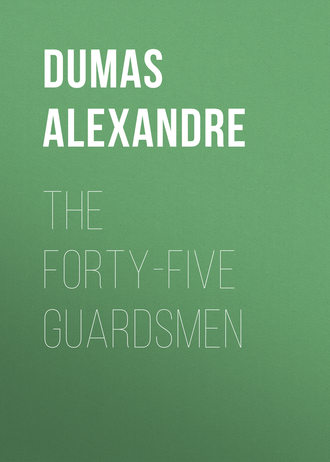
Александр Дюма
The Forty-Five Guardsmen
CHAPTER LXIX.
FLIGHT
Henri, without losing time in reasoning with Diana, carried her out of the house, and wished to place her before him on his horse; but she, with a movement of invincible repugnance, glided from his arms, and was received by Remy, who placed her on her own horse.
"Ah, madame!" cried Henri, "how little you understand my heart. It was not, believe me, for the pleasure of holding you in my arms, or pressing you to my heart, although for that favor I would sacrifice my life, but that we ought to fly as quickly as the birds, and look at them, how they fly!"
Indeed, in the scarcely dawning light were seen large numbers of curlews and pigeons, traversing the air with a quick and frightened flight, which, in the night, usually abandoned to the silent bat, looked strange to the eye, and sounded sinister to the ear.
Diana did not reply, but rode on without turning her head. Her horse, however, as well as that of Remy, was fatigued with their long journey, and Henri, as he turned back each moment, saw that they could not keep up with him.
"See, madame!" said he, "how my horse outstrips yours, and yet I am holding him in with all my strength; for Heaven's sake, madame, while there is yet time, if you will not ride with me, take my horse and leave me yours."
"No, thank you, monsieur," replied she, in her usual calm voice.
"But, madame," cried Henri, in despair, "the water gains on us; do you hear! do you hear?"
Indeed, a horrible crashing was now heard; it was the dyke of a neighboring village giving way, to swell the inundation. Boards and props had given way, a double row of stakes broke with a noise like thunder, and the water, rushing over the ruins, began to invade an oak wood, of which they saw the tops trembling, and heard the branches cracking as though a flight of demons were passing under the leaves.
The uprooted trees knocking against the stakes, the wood of ruined houses floating on the waters, the distant neighings and cries of horses and men carried away by the inundation, formed a concert of sounds so strange and gloomy that the terror which agitated Henri began to seize also upon Diana. She spurred her horse, and he, as if he understood the danger, redoubled his efforts. But the water gained on them, and before ten minutes it was evident that it would reach them. Every instant Henri turned and cried, "Quicker, madame! for pity's sake; the water comes; here it is!"
It came, indeed, foaming and turbulent, carrying away like a feather the house in which they had taken shelter; and majestic, immense, rolling like a serpent, it arrived like a wall behind the horses of Remy and Diana. Henri uttered a cry of terror, and turned on the water, as though he would have fought it.
"You see you are lost!" screamed he. "Come, madame, perhaps there is still time; come with me."
"No, monsieur," said she.
"In a minute it will be too late; look!" cried he.
Diana turned; the water was within fifty feet of her.
"Let my fate be accomplished," said she; "you, monsieur, fly."
Remy's horse, exhausted, fell, and could not rise again, despite the efforts of his rider.
"Save her in spite of herself," cried Remy.
And at the same moment, as he disengaged himself from the stirrups, the water passed over the head of the faithful servant. His mistress, at this sight, uttered a terrible cry, and tried to jump off her horse to perish with him. But Henri, seeing her intention, seized her round the waist, and placing her before him, set off like an arrow.
"Remy! Remy!" cried she, extending her arms. A cry was the only answer. Remy had come up to the surface, and, with the indomitable hope which accompanies the dying man to the last, was swimming, sustained by a beam. By his side came his horse, beating the water desperately with his feet, while the water gained on Diana's horse, and some twenty feet in front Henri and Diana flew on the third horse, which was half mad with terror.
Remy scarcely regretted life, since he hoped that his loved mistress would be saved.
"Adieu, madame!" cried he. "I go first to him who waits for us, to tell him that you live for – "
He could not finish; a mountain of water rolled over his head.
"Remy! Remy!" cried the lady, "I wish to die with you. I will! monsieur, I will go to him; in the name of God, I will!"
She pronounced these words with so much energy and angry authority, that the young man unfolded his arms and let her slip to the ground, saying —
"Well, madame, we will all three die here together; it is a joy I had not hoped for."
As he said these words he stopped his horse, and the water reached them almost immediately; but, by a last effort of love, the young man kept hold of Diana's arm as she stood on the ground. The flood rolled over them. It was a sublime spectacle to see the sang-froid of the young man, whose entire bust was raised above the water, while he sustained Diana with one arm, and with the other guided the last efforts of his expiring horse.
There was a moment of terrible struggle, during which the lady, upheld by Henri, kept her head above water, while with his left hand he kept off the floating wood and the corpses which would have struck against them.
One of the bodies floating past sighed out, "Adieu, madame!"
"Heavens!" cried Henri, "it is Remy!" And without calculating the danger of the additional weight, he seized him by his sleeve, drew him up, and enabled him to breath freely. But the exhausted horse now sank in the water to its neck, then to its eyes, and finally disappeared altogether.
"We must die," murmured Henri. "Madame, my life and soul belonged to you."
As he spoke, he felt Remy slip from him, and he no longer tried to retain him – it was useless. His only care was to sustain Diana above the water, that she at least, might die the last, and that he might be able to say to himself, in his last moments, that he had done his utmost to save her. All at once, a joyful cry sounded at his side; he turned, and saw Remy, who had found a boat, which had belonged to the little house where they had taken shelter, and which the water had carried away. Remy, who had regained his strength, thanks to Henri's assistance, had seized it as it floated past. The oars were tied to it, and an iron hook lay in the bottom. He held out the hook to Henri, who seized it, and drawing Diana with him, raised her over his shoulders, and passed her to Remy, and then climbed in himself. The first rays of the rising sun showed them the plains inundated, and the boat swimming like an atom on that ocean covered with wrecks. Toward the left rose a little hill, completely surrounded by water, looking like an island in the midst of the sea. Henri took the oars and rowed toward it, while Remy, with the boat-hook, occupied himself in keeping off the beams and wrecks which might have struck against them. Thanks to Henri's strength and Remy's skill, they reached, or, rather, were thrown against, the hill. Remy jumped out, and, seizing the chain, drew the boat toward him; Diana, rising alone, followed him, and then Henri, who drew up the boat and seated himself a little way from them. They were saved from the most menacing danger, for the inundation, however strong, could never reach to the summit of the hill. Below them they could see that great angry waste of waters, which seemed inferior in power only to God himself; and, by the increasing light, they perceived that it was covered with the corpses of French soldiers.
Remy had a wound in his shoulder, where a floating beam had struck against him; but Diana, thanks to Henri's protection, was free from all injury, although she was cold and wet. At last they noticed in the horizon, on the eastern side, something like fires burning on a height which the water could not reach. As well as they could judge, they were about a league off. Remy advanced to the point of the hill, and said that he believed he saw a jetty advancing in a direct line toward the fires. But they could see nothing clearly, and knew not well where they were, for though day was dawning, it came cloudily and full of fog; had it been clear and under a pure sky, they might have seen the town of Mechlin, from which they were not more than two leagues distant.
"Well, M. le Comte," said Remy, "what do you think of those fires?"
"Those fires, which seem to you to announce a hospitable shelter, appear to me to be full of danger."
"And why so?"
"Remy," said Henri, lowering his voice, "look at these corpses; they are all French – there is not one Fleming; they announce to us a great disaster. The dykes have been broken to finish the destruction of the French army, if it has been conquered – to nullify the victory, if they have been victors. Those fires are as likely to have been lighted by enemies as by friends, and may be simply a ruse to draw fugitives to destruction."
"Nevertheless, we cannot stay here; my mistress will die of cold and hunger."
"You are right, Remy; remain here with madame, and I will go to the jetty, and return to you with news."
"No, monsieur," said Diana, "you shall not expose yourself alone; we have been saved together; we will live or die together. Remy, your arm. I am ready."
Each word which she pronounced had so irresistible an accent of authority that no one thought of disputing it. Henri bowed, and walked first.
It was more calm; the jetty formed, with the hill, a kind of bay, where the water slept. All three got into the little boat, which was once more launched among the wrecks and floating bodies. A quarter of an hour after, they touched the jetty. They tied the chain of the boat to a tree, landed once more, walked along the jetty for nearly an hour, and then arrived at a number of Flemish huts, among which, in a place planted with lime trees, were two or three hundred soldiers sitting round a fire, above whom floated the French flag. Suddenly a sentinel, placed about one hundred feet from the bivouac, cried, "Qui vive?"
"France," replied Du Bouchage. Then, turning to Diana, he said, "Now, madame, you are saved. I recognize the standard of the gendarmes of Aunis, a corps in which I have many friends."
At the cry of the sentinel and the answer of the comte several gendarmes ran to meet the new comers, doubly welcome, in the midst of this terrible disaster, as survivors and compatriots. Henri was soon recognized; he was eagerly questioned, and recounted the miraculous manner in which he and his companions had escaped death. Remy and Diana had sat down silently in a corner; but Henri fetched them and made them come to the fire, for both were still dripping with water.
"Madame," said he, "you will be respected here as in your own house. I have taken the liberty of calling you one of my relations."
And without waiting for the thanks of those whose lives he had saved, he went away to rejoin the officers.
The gendarmes of Aunis, of whom our fugitives were claiming hospitality, had retired in good order after the defeat and the sauve qui peut of the chiefs. Whereever there is similarity of position and sentiment, and the habit of living together, it is common to find unanimity in execution as well as in thought. It had been so that night with the gendarmes of Aunis; for seeing their chiefs abandon them, they agreed together to draw their ranks closer, instead of breaking them. They therefore put their horses to the gallop, and, under the conduct of one of the ensigns, whom they loved for his bravery and respected for his birth, they took the road to Brussels.
Like all the actors in this terrible scene, they saw the progress of the inundation, and were pursued by the furious waters; but by good luck found in this spot a position strong both against men and water. The inhabitants, knowing themselves in safety, had not quitted their homes, and had only sent off their women, children, and old men to Brussels; therefore the gendarmes met with resistance when they arrived; but death howled behind them, and they attacked like desperate men, triumphed over all obstacles, lost ten men, but established the others, and turned out the Flemings.
Such was the recital which Henri received from them.
"And the rest of the army?" asked he.
"Look," replied the ensign; "the corpses which pass each moment answer your question."
"But – my brother," said Henri, in a choking voice.
"Alas! M. le Comte, we do not know. He fought like a lion, but he survived the battle; as to the inundation I cannot say."
Henri shook his head sadly; then, after a minute's pause, said, "And the duke?"
"Comte, the duke fled one of the first. He was mounted on a white horse, with no spot but a black star on the forehead. Well, just now we saw the horse pass among a mass of wrecks, the foot of a rider was caught in the stirrup and was floating on the water."
"Great God!"
"Good heavens!" echoed Remy, who had drawn near and heard the tale.
"One of my men ventured down into the water and seized the reins of the floating horse, and drew it up sufficiently to enable us to see the white boot and gold spur that the duke wore. But the waters were rushing past, and the man was forced to let go to save himself, and we saw no more. We shall not even have the consolation of giving a Christian burial to our prince."
"Dead! he also? the heir to the crown! What a misfortune!"
Remy turned to his mistress, and with an expression impossible to describe, said,
"He is dead, madame, you see."
"I praise the Lord, who has spared us a crime," said she, raising her eyes to heaven.
"Yes, but it prevents our vengeance."
"Vengeance only belongs to a man when God forgets."
"But you, yourself, comte," said the ensign to Henri, "what are you about to do?"
The comte started. "I?" said he.
"Yes."
"I will wait here till my brother's body passes," replied he, gloomily, "then I will try to draw him to land. You may be sure that if once I hold him, I shall not let go."
Remy looked pityingly at the young man; but Diana heard nothing – she was praying.
CHAPTER LXX.
TRANSFIGURATION
After her prayer Diana rose so beautiful and radiant that the comte uttered a cry of surprise and admiration. She appeared to be waking out of a long sleep, of which the dreams had fatigued her and weighed upon her mind; or rather, she was like the daughter of Jairus, called from death and rising from her funeral couch, already purified and ready for heaven. Awakening from her lethargy, she cast around her a glance so sweet and gentle, that Henri began to believe he should see her feel for his pain, and yield to a sentiment of gratitude and pity. While the gendarmes, after their frugal repast, slept about among the ruins, while Remy himself yielded to it, Henri came and sat down close to Diana, and in a voice so low and sweet that it seemed a murmur of the breeze, said:
"Madame, you live. Oh! let me tell you all the joy which overflows my heart when I see you here in safety, after having seen you on the threshold of the tomb."
"It is true, monsieur," replied she; "I live through you, and I wish I could say I was grateful."
"But, madame," replied Henri, with an immense effort, "if it is only that you are restored to those you love?"
"What do you mean?"
"To those you are going to rejoin through so many perils."
"Monsieur, those I loved are dead! those I am going to rejoin are so also."
"Oh, madame!" cried Henri, falling on his knees, "throw your eyes on me – on me, who have suffered so much and loved so much. Oh, do not turn away; you are young, and beautiful as the angels in heaven; read my heart, which I open to you, and you will see that it contains not an atom of that love that most men feel. You do not believe me? Examine the past hours; which of them has given me joy, or even hope? yet I have persevered. You made me weep; I devoured my tears. You made me suffer; I hid my sufferings. You drove me to seek death, and I went to meet it without a complaint. Even at this moment, when you turn away your head, when each of my words, burning as they are, seems a drop of iced water falling on your heart, my soul is full of you, and I live only because you live. Just now, was I not ready to die with you? What have I asked for? Nothing. Have I touched your hand? Never, but to draw you from a mortal peril. I held you in my arms to draw you from the waves – nothing more. All in me has been purified by the devouring fire of my love."
"Oh, monsieur! for pity's sake do not speak thus to me."
"Oh, in pity do not condemn me. He told me you loved no one; oh! repeat to me this assurance; it is a singular favor for a man in love to ask to be told that he is not loved, but I prefer to know that you are insensible to all. Oh, madame, you who are the only adoration of my life, reply to me."
In spite of Henri's prayers, a sigh was the only answer.
"You say nothing," continued the comte; "Remy at least had more pity for me, for he tried to console him. Oh! I see you will not reply, because you do not wish to tell me that you came to Flanders to rejoin some one happier than I, and yet I am young, and am ready to die at your feet."
"M. le Comte," replied Diana, with majestic solemnity, "do not say to me things fit only to be said to a woman; I belong to another world, and do not live for this. Had I seen you less noble – less good – less generous, had I not for you in the bottom of my heart the tender feeling of a sister for a brother, I should say, 'Rise, comte, and do not importune with love my ears, which hold it in horror.' But I do not say so, comte, because I suffer in seeing you suffer. I say more; now that I know you, I will take your hand and place it on my heart, and I will say to you willingly, 'See, my heart beats no more; live near me, if you like, and assist day by day, if such be your pleasure, at this painful execution of a body which is being killed by the tortures of the soul;' but this sacrifice, which you may accept as happiness – "
"Oh, yes!" cried Henri, eagerly.
"Well, this sacrifice I ought to forbid. This very day a change has taken place in my life; I have no longer the right to lean on any human arm – not even on the arm of that generous friend, that noble creature, who lies there, and for a time finds the happiness of forgetfulness. Alas! poor Remy," continued she, with the first change of tone that Henri remarked in her voice, "your waking will also be sad; you do not know the progress of my thought; you cannot read in my eyes that you will soon be alone, and that alone I must go to God."
"What do you mean, madame? do you also wish to die?"
Remy, awakened by the cry of the young count, began to listen.
"You saw me pray, did you not?" said Diana.
"Yes," answered Henri.
"This prayer was my adieu to earth; the joy that you remarked on my face – the joy that fills me even now, is the same you would see in me if the angel of death were to come and say to me, 'Rise, Diana, and follow me.'"
"Diana! Diana! now I know your name; Diana, cherished name!" murmured the young man.
"Oh, silence!" cried she, "forget this name which escaped me; no living person has the right to pierce my heart by pronouncing it."
"Oh! madame, do not tell me you are going to die."
"I do not say that," replied she in her grave voice; "I say that I am about to quit this world of tears – of hatreds – of bad passions – of vile interests and desires. I say that I have nothing left to do among the creatures whom God created my fellow mortals; I have no more tears, no more blood in my heart; no more thoughts – they are dead. I am a worthless offering, for in renouncing the world I sacrifice nothing, neither desires nor hopes; but such as I am I offer myself to my God, and he will accept me – he who has made me suffer so much, and yet kept me from sinking under it."
Remy, who had heard this, rose slowly, and said, "You abandon me?"
"For God," said Diana, raising her thin white hand to heaven.
"It is true," said Remy, sadly; and seizing her hand he pressed it to his breast.
"Oh! what am I by these two hearts?" said Henri.
"You are," replied Diana, "the only human creature, except Remy, on whom I have looked twice for years."
Henri knelt. "Thanks, madame," said he, "I bow to my destiny. You belong to God; I cannot be jealous."
As he rose, they heard the sound of trumpets on the plain, from which the water was rapidly disappearing. The gendarmes seized their arms and were on horseback at once.
Henri listened. "Gentlemen," cried he, "those are the admiral's trumpets; I know them. Oh, God! may they announce my brother!"
"You see that you still wish something, and still love something; why, then, should you choose despair, like those who desire nothing – like those who love no one?"
"A horse!" cried Henri; "who will lend me a horse?"
"But the water is still all around us," said the ensign.
"But you see that the plain is practicable; they must be advancing, since we hear their trumpets."
"Mount to the top of the bank, M. le Comte, the sky is clear, perhaps you will see."
Henri climbed up; the trumpets continued to sound at intervals, but were seemingly stationary.







